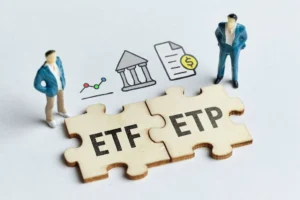The digital money market resembles a rollercoaster of new trends, speculative activity and constant control by authorized bodies. With various crypto coins, including Bitcoin and Ethereum, now in the spotlight, the economic sector is adapting to this asset category. One of the critical phases of this development was the launch of cryptocurrency exchange-traded funds (ETFs). Such systems simplify the entry of significant industry players into cryptocurrency, successfully combining classical economic elements and advanced technologies. This blog post will tell you what cryptocurrency ETF is, how it performs and how it impacts the investment sector ecosystems.
What is a Crypto ETF?
ETF crypto investment is a promising financial technology that mixes the profits of exchange-traded funds and digital money. Essentially, a cryptocurrency ETF is a fund that controls the movement in the worth of various virtual assets so that market participants can build a diverse portfolio of investments without purchasing specific crypto coins and studying blockchain solution.
This investment algorithm has won many fans due to its comfort. Unlike purchasing and storing selected digital money, which can be overly sophisticated and risky, investing in crypto ETFs is as easy as buying securities.


Turnkey Brokerage Solution For Your Business
Get the most profitable fully licensed fx/crypto brokerage software or ready-to-operate business in 48 hours. Best-in-class web & mobile trading platforms, sales-driven CRM, full integration with MT4/5, and 150+ payment providers.
How Does a Cryptocurrency ETF Work?
If we analyze the functioning of classic ETFs, they repeat the action of indices, forming a set of basic assets. Collaboration with spot ETF requires the purchase of digital coins to obtain a package that fully reflects the value of its resources. However, most cryptocurrency ETFs provide for the purchase of futures, that is, contracts to purchase or sell crypto coins in a certain period at an agreed price.
Market members can perform operations with crypto ETF on standard exchanges, suggesting a familiar and comfortable space for those just starting their journey with digital money. Simply put, users may invest in crypto coins through standard brokerage accounts, avoiding the hassle of exchanging cyber money and learning the functionality of cryptocurrency wallet and private keys.
Considering what financial instruments are included in the portfolio, it is logical that the worth of the securities in the set reflects the fluctuation in the value of derivatives, not the cryptocurrency investment itself. It means the rise or fall in the selected ETF’s share price is linked to the cost of cryptocurrency’s futures. Like any famous derivatives, synthetic crypto ETFs pose additional challenges as they may not be easy to manipulate.
What are the Benefits of Cryptocurrency ETFs?
The cryptocurrency area exhibits significant volatility due to its small size, so some entrepreneurs hesitate to invest their capital. Let’s consider the main advantages of interacting with crypto-ETFs when compared with other categories of crypto assets:
- Availability: market participants can transact with crypto coins during high volatility without creating additional accounts for these assets and incur additional expenditures for such activities.
- Diversification: don’t forget an exchange traded funds cryptocurrency can hold more than one resource. If we are talking about a Bitcoin ETF (despite its name), storing Ethereum or other shares is possible. It lets investors build diverse portfolios and protect themselves from the risks associated with the dominance of one asset.
- Efficient work with tax documents: due to the low level of regulation of crypto coins, many large entities, including pension funds, cannot directly authorize the purchase of such resources; however, when collaborating with ordered marketplaces, they allow you to file tax returns indicating a crypto-ETF successfully.
- Possibility of short selling: this function allows you to get maximum profit from a decrease in crypto prices or helps with hedging long positions. Cryptocurrency ETFs can be as volatile as the underlying digital assets, but this volatility can be contained because the ETF costs are lower. Let’s say the cost of crypto is $65,000, and an ETF is $45; then, a 3% drop in value has less effect on the ETF ($1.35) than on crypto coins ($1,950).
Although the global market capitalization of cryptocurrencies today is $2.4 trillion, the industry still doesn’t look very impressive compared to the tens of trillions of dollars held by standard hedge funds, mutual funds, insurance companies and other economic institutions. In the future decades, crypto ETFs could bridge the gap between the virtual and global economies, positively affecting Bitcoin and other coins.

Disadvantages of Crypto ETFs
Despite the long list of profits of crypto ETFs, they also have some downsides. Will analyze the leading factors that limit the rapid spreading of such structures:
- Lack of a unified global policy: Various regions have different regulations governing crypto-assets, which leads to controversial situations and conflicts. Some countries adopt specific categories of crypto ETFs, while other areas may have categorizations and requirements for digital assets.
- Lack of precise guidelines: Since such structures are new and complex, this creates problems for authorities in understanding and monitoring them. Authorized institutions often have questions regarding determining the value, conversion, storage and risk reduction of BTC ETF.
- Difficulties in protecting the interests of asset owners: Such digital resources are unstable, which can lead to significant losses or fraudulent schemes. Some market participants report they have experienced industry manipulation, outages, or defaults related to crypto ETFs or underlying resources.
- Low level of market infrastructure development: Such systems are often based on incompletely studied or unverified techniques that lack legal regulation and guarantees for crypto-ETFs. Owners of such assets, from time to time, complain about difficulties with access, as well as troubles when checking or transferring resources across various networks.
While crypto ETFs offer some options to increase security and manageability compared to purchasing specific crypto coins, they are not risk-free. Potential participants in the cryptocurrency ETF sector should study the ins and outs of funds and estimate their risk appetite, investment purposes and industry knowledge before collaborating with crypto ETFs and other digital resources.
Pros and Cons of Cryptocurrency ETF
Like any direct investment class, crypto ETFs have their strengths and weaknesses. Understanding both will help you recognize what suits your economic values and propensity to undertake risky operations. Let’s analyze the advantages of this structure:
- Comfort: crypto ETFs enable you to forget the difficulties of acquiring, selling and storing digital assets. You also don’t have to collaborate with all the elements of the blockchain. In most situations, crypto ETFs facilitate traders’ indirect entry into the crypto universe.
- Liquidity: all manipulations with ETFs take place on standard exchanges, which are more convertible than crypto marketplaces with ETF liquidity providers. Users may perform any operations in ETF securities during standard commercial hours.
- Reduced risks: with a crypto ETF, owners do not need to control the security aspects of cryptocurrency, including interacting with private keys, reducing the risks of theft and loss, and eliminating the need to create a cryptocurrency wallet, which can lead to human error and security troubles.
Let’s consider the main disadvantages of such financial systems:
- Lack of direct ownership: no matter how much an industry participant invests in a crypto ETF, he does not receive ownership of the actual crypto coins. Thus, he is deprived of the critical profits of decentralization and anonymity that digital money has.
- Market volatility: although cryptocurrency ETFs simplify interaction with digital assets, they suffer due to sharp changes in the value, creating significant risks.
- Higher commission: such funds have a higher level of spending due to active management compared to classic ETFs.
Although crypto ETFs are hardly an ideal investment option, they provide good income to securities traders who refuse to open additional accounts to collaborate with crypto coins. There are likely many more advances to come in this industry.
Regulatory Considerations
The leading difficulty for all members in the cryptocurrency area is legislative control. New laws are regularly adopted in the crypto sector, and such adjustments may change the cost of digital money or the functioning of the funds with which they are connected.
The Securities and Exchange Commission (SEC) concentrates on spot crypto ETFs. Such structures invest directly in crypto coins instead of utilizing a derivative to predict changes in the cost of Bitcoin.
The SEC has long refused to recognize the legality of crypto ETF, arguing that experts do not fully recognize how these structures can protect market players from volatility. However, in the second half of 2021, the regulatory institution announced the SEC ruling to accredit the first ETF for digital assets, and the first spot ETFs in this sector appeared in early 2024.
Unfortunately, many regions have not officially approved the status of crypto coins. The fact is that such assets are often used in illegal activities, so some countries have decided to limit or completely ban the use of digital assets. If such measures continue to be adopted in the future, this could negatively affect the cost of crypto coins.
Crypto ETFs are an interesting phenomenon in the crypto space that provides a lot of profits for industry participants looking to gain access to digital assets in a comfortable and financially profitable way.
However, during ETF trading, entrepreneurs face normative complexities and uncertainties that may restrict their development and spread. Crypto-ETFs are already changing the industry ecosystem, building unique opportunities and difficulties for industry members and power institutions.






